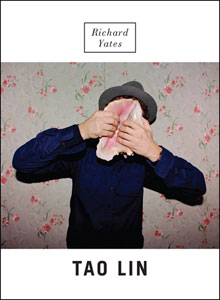
HIS OWN WORST ENEMY: Despite the novel’s cheeky title and character names, Tao Lin delivers his most compelling work yet. |
When this review is posted online, 27-year-old Tao Lin will quickly send out its URL in a tweet and file it on his website's meticulously maintained record of press coverage, where it will become part of a growing feedback loop that encompasses each morsel of glowing praise, cruel condemnation, and confusion directed at the idiosyncratic author and his works, alongside contests that promise money and free books to readers who send him Gmail chats or film discussions about the novel. It's all part of a symbiotic online publicity machine that has defined Lin as a relentless literary stuntman as much as his words have defined him as a writer.
Richard Yates | by Tao Lin | Melville House | 208 pages | $14.95 |
In the past, the marketing mechanism drew attention to short-story and poetry collections, a novel, and a novella that might otherwise have been consigned to oblivion. But with his latest — a batty and precisely penned novel called
Richard Yates — it's a distraction from the words of someone who has, in methodically stacked increments, become a legitimate writing presence, with a vacant and sparse brand of narration stringing together vignettes that expressed the boredom, futility, and emotional detachment of his existence.
Here he's applied his trademark narrative hum to the romance between a 22-year-old writer living in New York and a 16-year-old girl living in a faceless New Jersey suburb — a couple whom, for whatever reasons, Lin has chosen to name Haley Joel Osment and Dakota Fanning. (Also unexplained is the book's title reference to the late, great American novelist and short-story writer.) The characters — whose correspondence takes place primarily through email, Gmail chat, and text message — begin seeing one another in person. The obstacles they face in shielding their relationship from Dakota's half-witted mother pale in comparison to the demons inherent in their dysfunctional bond.
Dakota, who slowly reveals the nitty-gritty of some deep-seated emotional problems, comes to act as a helpless, self-loathing child. That's matched by Haley's growing compulsion to track and dissect her every move and attack her slip-ups. When she does something as inconsequential as neglecting to drink coffee, he says: "But I like it when someone I like wants to drink coffee on their own volition in order to be more alive around me. . . . Why would you not want that, I still don't understand." And she indulges this destructive dynamic: "Dakota Fanning was apologizing many times a day and then writing in a Moleskine notebook what she did wrong, why it was wrong based on what she wanted in life, how she wanted to act in the future." The whole mess culminates in a several-pages-long email in which Dakota details each insignificant way in which she's ever deceived Haley.
For a change, Lin's rigor is as effective in portraying (often deranged) human behavior as it is in self-promotion. This from Haley: "I think we're holding each other like this so we can't see each other and don't have to do anything. We don't know what to do. I should decide something and do it. I feel like she is thinking the same things I am." Richard Yates probably couldn't have come into existence without the buzz-generating antics that have earned Tao Lin a reputation as a prankster. But it's also the novel that begs him to divorce his work from the sideshow.